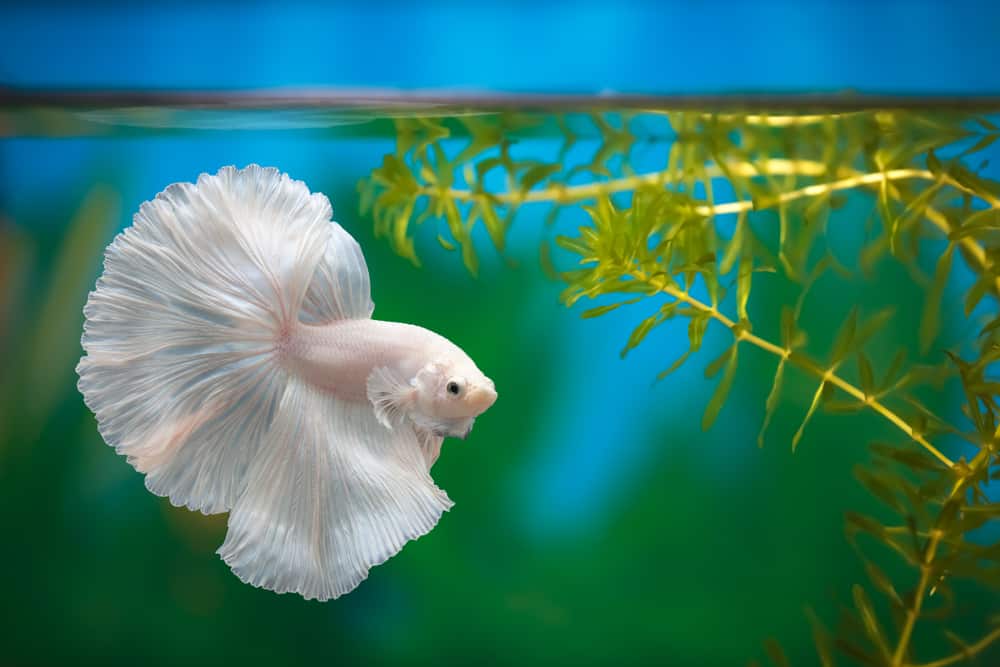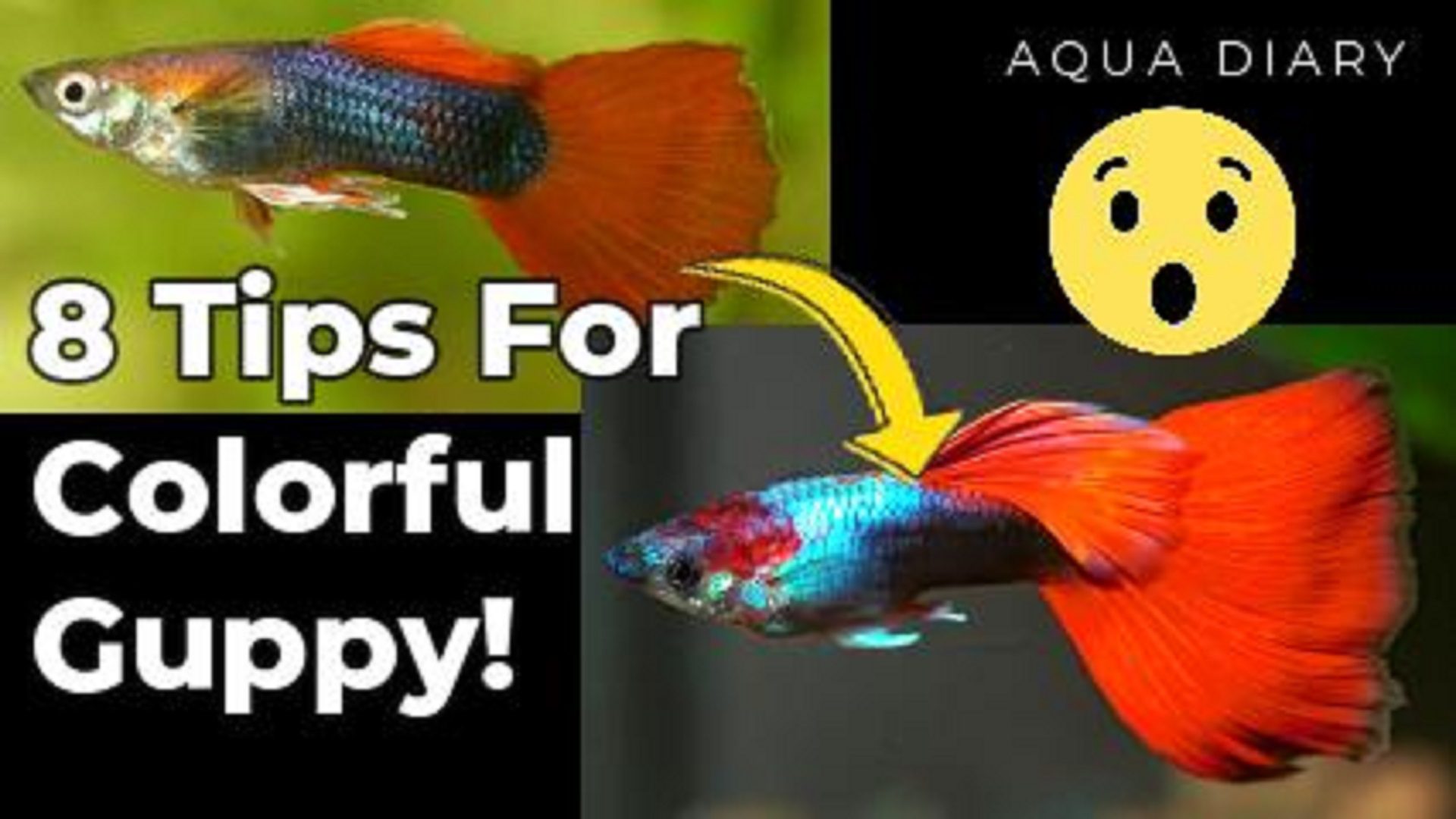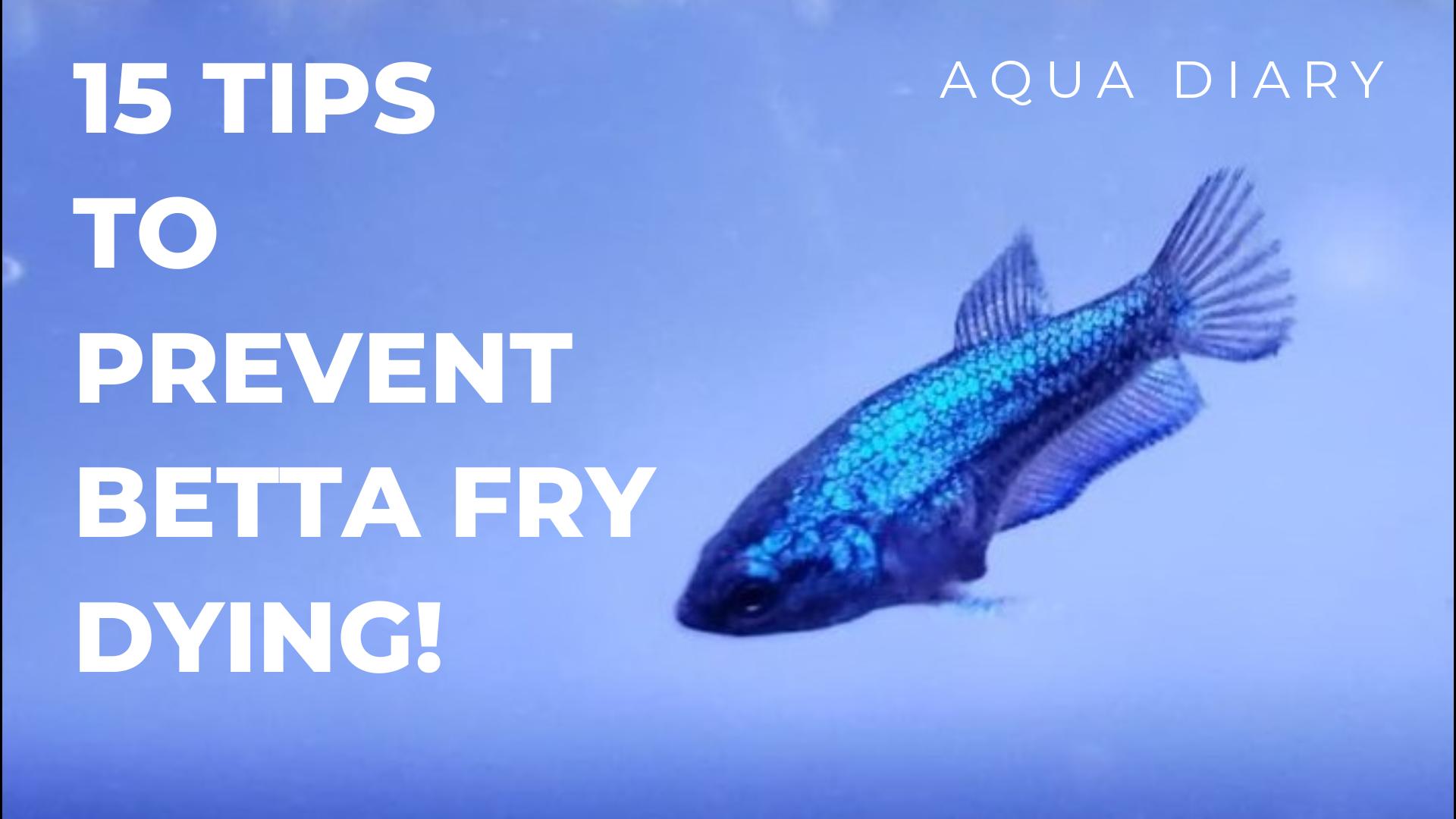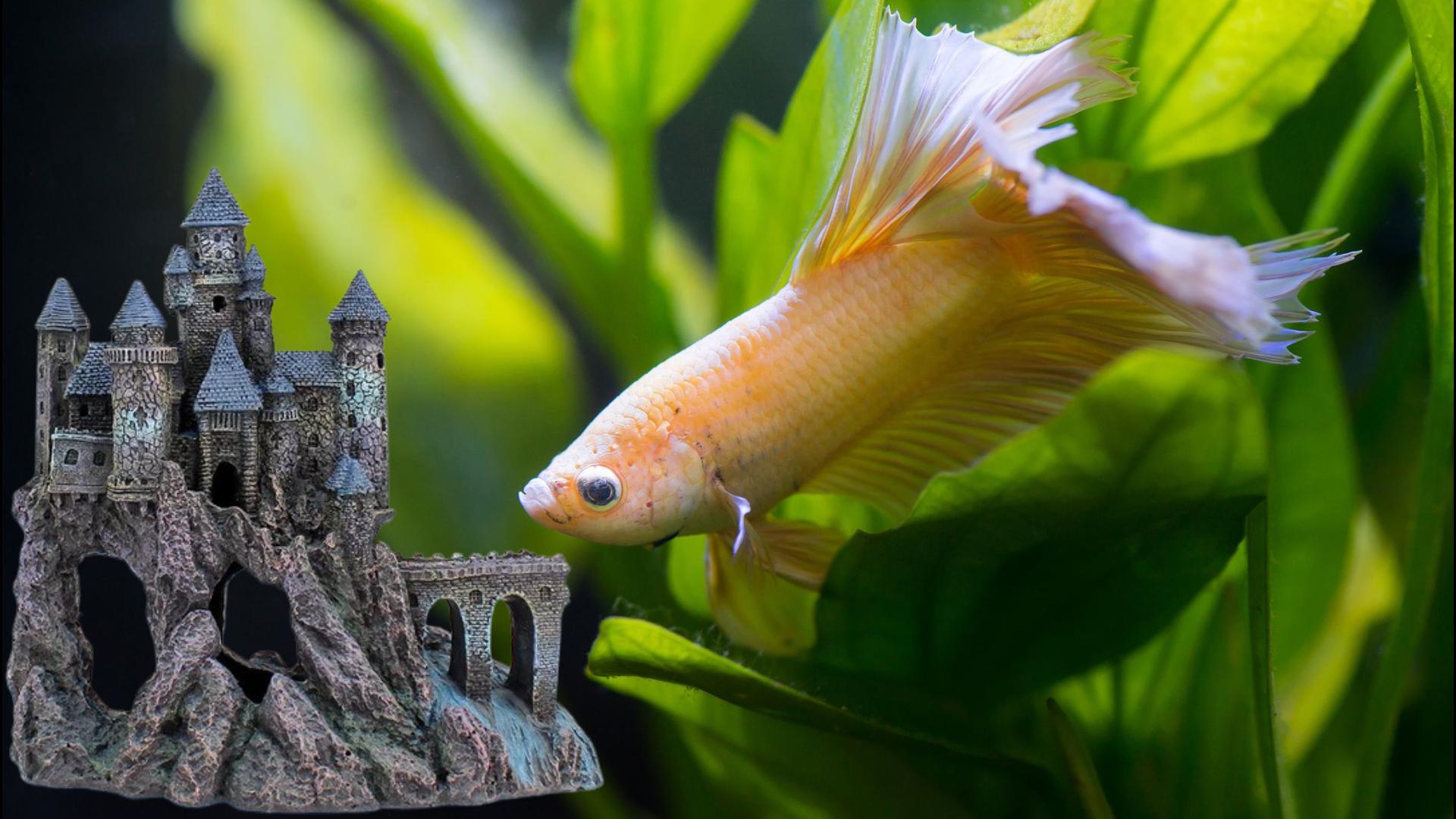There are well-known ways to tell if your betta fish is healthy and happy in its tank, even when it is kept alone. Betta fish are among the most popular pets among fish keepers. Considering the territorial nature of betta and that they are naturally slow swimming behavior, often it’s confusing for betta keepers to identify whether betta is happy. In this blog, we are going to discuss signs of happy and healthy betta to determine your betta fish.
Signs of a Happy Betta Fish
Bettas are attractive fish that are normally maintained in tanks by themselves since males can be aggressive toward other fish. ??However, they can share a tank with other compatible fish species if you choose the right ones. Observe your betta’s behavior and tank surroundings to see if they’re thriving and happy, whether you keep them with other fish or alone. It’s critical to observe your betta fish every day for indicators of typical, healthy behavior as well as symptoms that they may be bored or ill.
Betta Bubble Nests – Happy Betta fish

Building a “bubble nest” is one of the most visible symptoms of a happy betta fish. Look for a clump of bubbles on the tank’s surface, otherwise, your betta may truly be blowing the nest.?? When male bettas are ready to mate, they build bubble nests, and a fish would only do this instinctively if they felt safe and secure. If you don’t see bubble nests in your tank, it doesn’t necessarily imply your betta is unhappy. Every male betta will build bubble nests at their own pace, which could be as often as once a day or once every six months. Although some female bettas may build bubble nests, this is typically a male activity.
Feeding Behavior.
Recognizing when it’s feeding time is one indicator of their intelligence. When you come to the tank to feed it, a happy, well-adjusted betta will begin to swim over to you, especially if you feed in the same spot. When you add food to the tank, they will excitedly move toward it and consume it.
Normal Activity.
A betta who is happy in his surroundings would interact with it on a frequent basis. This entails swimming around your tank’s ornaments and plants. If a betta only stays in one spot, particularly at the bottom of the tank, and ignores his surroundings, he may be sick. This is not to be confused with sleeping, which all bettas do and is entirely natural.
Not Hiding.
Another sign of a happy betta fish is one who is active in his aquarium and can be easily found. If you’re having problems finding your betta in the tank because he’s always hiding, it’s a sign that he’s stressed or ill. Bettas prefer hiding in ornaments with hiding spots, but they shouldn’t spend all of their time in them and ignore the rest of the tank.
Effortless Swimming.
Every day, a joyful betta will swim around their tank. They’ll move around almost sluggishly at times, and then quickly flit from side to side at other moments. Your betta is healthy and happy if it appears to have no trouble swimming and isn’t tilting to the side or struggling. When a betta isn’t feeling well, he or she may have difficulty swimming and appear uncoordinated. They may also remain near the bottom of the tank, displaying symptoms of struggling to swim away.
Getting Along With Tank Mates.
If you keep betta in a community tank, seeing your betta engage with other compatible fish in a non-aggressive manner is a good sign. This means he can swim around or past them without becoming agitated or chasing them. If your betta is flaring his fins, chasing them, or even nibbling at them, it’s an indication he’s unhappy, and you should remove the other fish from his tank.
Vibrant Color and flared fins – Happy Betta fish

This is another sign of a happy betta. As it is bettas are very colorful and have exotic colors and majestic fins and tails. The upkeep of the vibrancy of colors indicates a happy and healthy pet. Similarly, well-flared and neat fins are signs of good fish.
Offer yummy treats on occasion – Happy Betta fish
Betta’s love freeze-dried snacks and live food, like bloodworms. Live food is the most nutritional for your betta as it’s what he would eat in his natural habitat. We recommend live worms as first choice, because as a true freshwater species, they can live for quite a while in your aquarium without fouling the water, also mostly available to buy it from local pet stores. also gives high nutritious and mentally stimulating they are for bettas.
Keeping Quality Tank Environment.
Providing for a betta fish’s emotional and physical requirements is a simple way to keep them happy. This means they’ll need a tank that’s the right size, good food, and a lot of plants and decorations in their tank. You’re on the right track if you see the indicators of a happy betta fish. You can change your betta fish’s daily schedule if you notice indicators that they are sick or melancholy by watching their daily routine.
Betta toys – Happy Betta fish
Bettas are intelligent fish that may be taught to perform tricks such as swimming through hoops. Try adding fish toys into the tank. By keeping your Betta in an active environment they won’t get bored. More and more fish toys are becoming available on the market every day to help stimulate your tank environment.
Signs of Depression in a Betta

Recognizing signs of depression in your Betta fish is vital. Look for changes in eating habits, such as reluctance to eat or ignoring food. A decrease in activity level, hiding, faded color, clamped fins, and unusual swimming patterns are all potential indicators. If you notice any of these signs, take action promptly to improve their environment and well-being. Your attentive care can ensure your Betta fish stays healthy and happy.
Did we miss any other symptoms of happy betta? What issues have you faced with your pet betta? Please let us know what you think in the comments section below. Also, check this blog for more insights into betta fish happiness in blog format.
How to Create a Bond with Your Betta Fish
Now, let’s look at how to create bond with your fish. Betta fish are intelligent creatures that can form strong bonds with their owners. In this blog, we’ll share simple tips on how to create a bond with your betta fish and create a meaningful relationship with your favorite pet. If you love your fish and would like to create a bond with it, read until the end as we have a lot.
It’s common to hear people say fish can’t be great pets like dogs or other animals. It’s because you can’t interact with fish as much as you do with other animals. But the reality is that there are several ways you can extend your bond with your Betta fish.
Name your Betta fish.
You can’t make a connection with a nameless creature, so pick a name that suits the personality of your pet Betta fish. If you need some help finding Betta names, we already have an awesome fish name suggestion blog on our channel. A Betta fish is sensitive to vibrations in the water caused by sounds such as human voices, which some people believe means it can recognize your voice and its name. Say your Betta fish’s name every time you visit to see if you can trigger a reaction. It is also beneficial if you talk to the fish since it keeps you connected to it and it may begin to recognize you as its owner.
Oh wait! Can Betta fish really recognize their owners?
Betta fish are intelligent and social creatures that enjoy interaction and attention. Over time, your betta fish may learn to recognize you and associate you with positive experiences like feeding and playing. However, it’s important to remember that each betta fish has its own personality and preferences, so not all betta fish will bond with their owners in the same way.
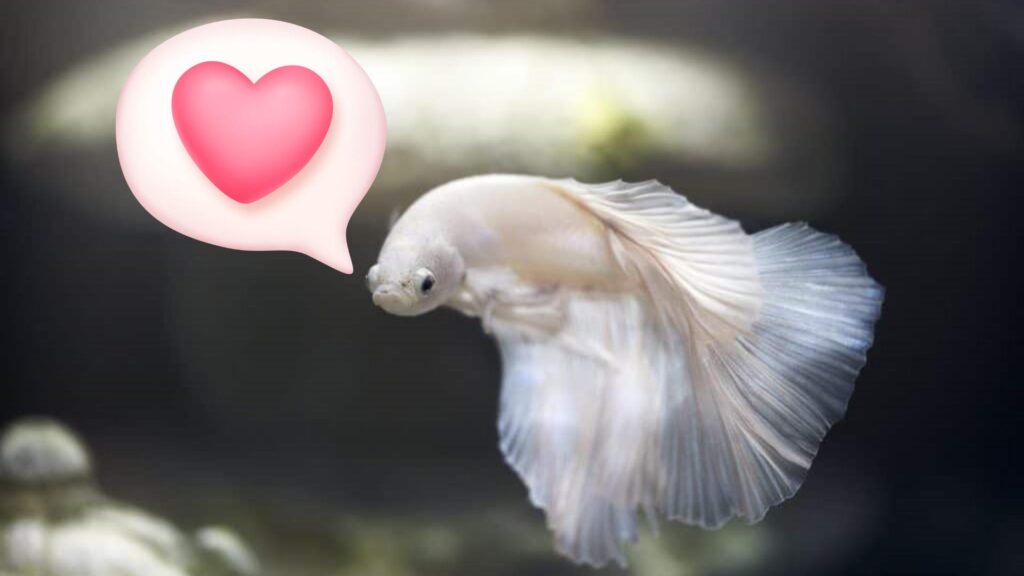
Keep your fish tank in an active area
Betta fish usually prefer to live alone, but they easily get bored in their tank. In my experience, betta tanks near an active part of the house or office keep them curious and happy. Place your Betta fish tank in a high-traffic, regularly occupied part of the house, like the living room, the kitchen, or your office. It doesn’t matter if they aren’t being interacted with directly, Betta fish-like movement and action. In addition, try moving the tank around the room sometimes to keep it fresh. Also Betta fish require a clean and healthy environment to thrive. You can keep the tank clean by performing regular water changes and keeping the tank free of debris. A clean tank will help your betta fish feel more comfortable and relaxed, which will make it easier to bond with them.
Give it visual stimulation.
The male betta is known to “flare” his fins when seeing his reflection in a mirror or encountering another betta fish. It is debatable whether frequent “mirror flare-ups” are good for your betta, but I would recommend using the mirror for a few minutes every day to provide them with some exercise that is fun for pet keepers as well. Betta fish are curious creatures that enjoy exploring their surroundings. You can provide a stimulating environment for your betta fish by adding plants, decorations, and hiding spots to the tank. This will give your betta fish plenty of opportunities to explore and play. It’s really fun to watch your Betta investigate and react to these new tank additions. You can also doodle on the tank with dry-erase markers or apply sticky notes cut into different shapes, or just simply place new and interesting objects just outside the tank.
Spend time with your Betta fish
You can spend time with your Betta fish by simply sitting next to the tank and observing them. The best way to bond with a betta is to treat it like any other pet animal. Growing a bond with any type of creature takes effort, patience, openness, and care. Betta fish are responsive to sound and can recognize their owners’ voices. You can talk to your Betta fish to help build a connection with them. This will also help your Betta fish get used to your presence and feel more comfortable around you.
Play with your Betta fish – Bond With Betta
You should never tap a fish tank because the sound is amplified in the water and will stress out your fish. Instead, trace your finger along the glass and watch the fish’s reaction. It is likely that your Betta will start coming over to your finger, and even following it along the tank wall. You might be able to get your fish to twist and loop in its pursuit. Bettas like to come to the surface, so bobbing toys and other objects can be a good idea for playtime as well. You can also provide toys like floating balls or tunnels for your betta fish to explore. Check out the How to Train Your Betta Fish blog on our channel for plenty more playtime ideas. No one wants their Betta fish to live in small, tiny cups like these.
Training your betta – Bond With Betta
Like most animals, food treats can be a powerful motivation for your Betta to train. With some patience and practice, your fishy friend can learn some fun tricks. You can teach your betta to eat from your fingers by placing your digits increasingly closer to the food pellets you place in the water. This will ensure that the fish takes the food right from them. Your Betta may even be able to leap out of the water to take food from your fingers. The lure of food can be used to teach betta fish to swim, or sometimes even leap, through hoops. You might also, with practice, be able to teach your fish to push that ping-pong ball it plays with into a net.
Feed it properly – Bond With Betta
There are three main foods you should feed betta fish: betta fish pellets, bloodworms, and shrimps. In a day, two feedings of four to five pellets or six to seven bloodworms or brine shrimp should be enough for your pet fish. Bettas will overeat if given the chance, to the detriment of their health. They can also suffer from constipation, so you have to be careful when feeding them to avoid getting them sick. Betta fish can learn to recognize their owners and associate them with food. You can offer food to your betta fish by hand, which will help to build trust and strengthen the bond between you and your fish.
Do betta fish bite when being fed by hand?
Betta fish are not typically aggressive towards humans, and they are not known for biting. Even if they bite you, it won’t hurt any worse than a minor nibble on your fingers. However, they can become territorial and aggressive towards other fish in the tank. This is why it’s critical to provide a suitable environment with plenty of space and hiding spots. Also, avoid touching your betta fish on a daily basis as this can cause stress and potentially lead to aggression. It may get rid of the slime coat on their bodies, which is very beneficial for betta fish. So I wouldn’t recommend touching your fish more often.
Provide a proper home – Bond With Betta
Betta fish may be seen in small containers like vases, but their preference for solitude has led to misconceptions about their habitat needs. Their ability to survive in small puddles doesn’t imply they thrive in confined spaces. Bettas’ natural habitat reflects their resilience during dry seasons, not their ideal conditions. In reality, they require ample space to explore. Opt for a tank of at least three to ten gallons for content and healthy Betta. Maintain a temperature of 76°F to 80°F, use a gentle filter, and uphold regular cleaning routines. Prioritize their well-being with a spacious, well-maintained tank.

